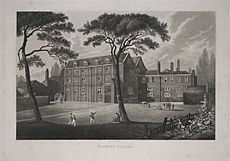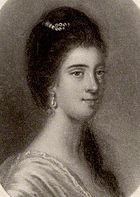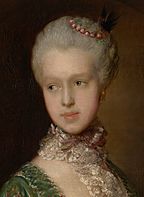Augustus FitzRoy, 3rd Duke of Grafton facts for kids
Quick facts for kids
The Duke of Grafton
|
|
|---|---|
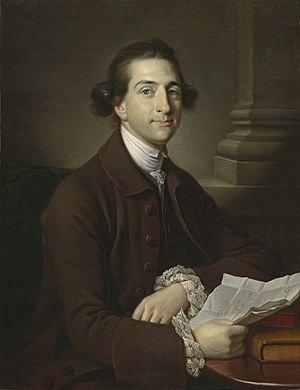
Portrait by Nathaniel Dance-Holland
|
|
| Prime Minister of Great Britain | |
| In office 14 October 1768 – 28 January 1770 |
|
| Monarch | George III |
| Preceded by | The Earl of Chatham |
| Succeeded by | Lord North |
| Northern Secretary | |
| In office 12 July 1765 – 14 May 1766 |
|
| Prime Minister | The Marquess of Rockingham |
| Preceded by | The Earl of Halifax |
| Succeeded by | Henry Seymour Conway |
| Personal details | |
| Born |
Augustus Henry FitzRoy
28 September 1735 |
| Died | 14 March 1811 (aged 75) Euston, Suffolk, England |
| Resting place | St Genevieve Churchyard, Euston, Suffolk, England |
| Political party | Whig |
| Spouses | |
| Children | 12; including George, William and John |
| Parent |
|
| Alma mater | Peterhouse, Cambridge |
| Signature | |
Augustus Henry FitzRoy, 3rd Duke of Grafton (born September 28, 1735 – died March 14, 1811), was an important British politician. He was a member of the Whig party. He is one of the few dukes who have ever served as prime minister of Great Britain.
He became prime minister in 1768 when he was 33 years old. This made him the youngest person to hold the job until William Pitt the Younger took over 15 years later. During his time as prime minister, Britain faced many challenges. He was criticized for letting France take over Corsica. He resigned in 1770 and was replaced by Lord North.
Contents
Early Life and School
Augustus Henry FitzRoy was the son of Lord Augustus FitzRoy. His father was a captain in the Royal Navy. His mother was Elizabeth Cosby. Augustus was a great-grandson of King Charles II. The name FitzRoy means "son of the king." This name was often given to children born outside of marriage to royalty.
Augustus was known as the Earl of Euston from 1747. He went to school at Newcome's School and Westminster School. After school, he traveled around Europe, which was called the "Grand Tour." He then earned a degree from Peterhouse at the University of Cambridge.
Starting His Political Career
In 1756, he became a member of Parliament. He represented a small area called Boroughbridge. Soon after, he moved to represent Bury St Edmunds, which his family controlled. A year later, his grandfather died. Augustus became the 3rd Duke of Grafton. This meant he moved from the House of Commons to the House of Lords.
He first became known for disagreeing with Lord Bute. Lord Bute was a close friend of King George III. Grafton joined forces with the Duke of Newcastle against Lord Bute. Lord Bute's time as prime minister ended quickly. Many felt he had not gotten a good enough deal for Britain in the Treaty of Paris after the Seven Years' War.
In 1765, Grafton became a Privy Counsellor. This is a group of advisors to the King. He then became Northern Secretary in Lord Rockingham's government. He left this job the next year. Then, William Pitt formed a new government. Grafton became the First Lord of the Treasury in this government. However, Pitt was the actual prime minister.
On September 20, 1769, he was given a special honor. He became a Knight of the Order of the Garter. This is one of the highest honors in Britain.
Becoming Prime Minister
Towards the end of 1767, William Pitt became ill. This meant Grafton became the main leader of the government. He is considered to have become prime minister in 1768. However, he faced many problems. There were disagreements in politics and issues like the Corsican Crisis. He was also attacked by a writer known as "Junius". Because of these challenges, he resigned in January 1770.
In 1768, Grafton also became the Chancellor of Cambridge University. Later, he served as Lord Privy Seal in Lord North's government from 1771. He resigned from this role in 1775. He believed Britain should try to make peace with the American colonists. He served as Lord Privy Seal again in 1782 and 1783.
His Religious Beliefs
In his later years, Grafton became a well-known Unitarian. This is a type of Christian belief. He was one of the first members of the Essex Street Chapel in 1774. He spent a lot of time studying religion after he left office. In 1773, he supported a law to allow Anglican clergy to not agree with all the Thirty-nine Articles. He wanted to see moral improvements among wealthy people. He also wanted changes to the church.
He wrote two books about his religious ideas:
- Hints Submitted to the Serious Attention of the Clergy, Nobility and Gentry, by a Layman (1789).
- Serious Reflections of a Rational Christian from 1788–1797.
He also helped pay for the printing of a Greek New Testament in 1796.
Love for Horseracing
The Duke of Grafton was also very interested in horse racing. His racing colors were sky blue with a black cap.
His Legacy
Many places are named after Augustus Henry FitzRoy. These include Grafton County, New Hampshire in the United States. The city of Grafton in Australia is also named after him. Other places include the town of Grafton, New York, and Grafton, Virginia. Cape Grafton in Australia was named by Lieutenant James Cook during his first voyage.
The Grafton Centre Shopping Mall in Cambridge is also named after him. It is located on Fitzroy Street.
Grafton lived a very long time after being prime minister. He had the longest post-premiership of any British prime minister. He lived for over 41 years after leaving the job.
Family Life
On January 29, 1756, he married Anne Liddell. They had three children together:
- Lady Georgiana FitzRoy (1757–1799)
- George Henry FitzRoy, 4th Duke of Grafton (1760–1844)
- General Lord Charles FitzRoy (1764–1829). His sons, Sir Charles FitzRoy (a governor) and Robert FitzRoy (a famous mapmaker), were notable.
Augustus and Anne divorced on March 23, 1769. Three months later, on June 24, 1769, the Duke married Elizabeth Wrottesley. They had nine children:
- Lord Henry FitzRoy (1770–1828)
- Lord Frederick FitzRoy (born 1774; died young)
- Lady Augusta FitzRoy (1779–1839)
- Lady Frances FitzRoy (1780–1866)
- Admiral Lord William FitzRoy (1782–1857)
- Lord John Edward FitzRoy (1785–1856)
- Lady Charlotte FitzRoy (died 1857)
- Lady Elizabeth FitzRoy (died 1839)
- Lady Isabella FitzRoy (died 1866)
Grafton was one of the few British prime ministers to get divorced. He was also one of the few to marry while in office. He passed away on March 14, 1811.
Coat of Arms
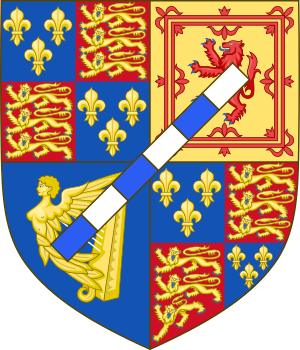 |
|
Images for kids
See also
 In Spanish: Augustus FitzRoy para niños
In Spanish: Augustus FitzRoy para niños
 | Audre Lorde |
 | John Berry Meachum |
 | Ferdinand Lee Barnett |


